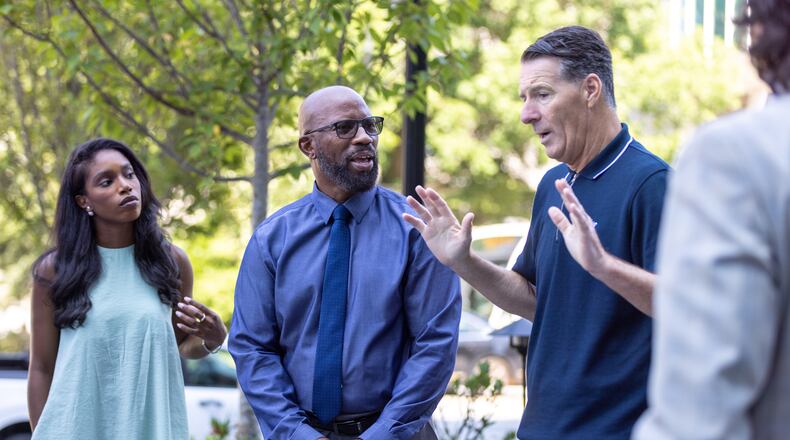Former professional soccer players met with physicians from Emory on Wednesday to promote the importance of being prepared to respond to emergency cardiac events in sports.
The event comes after Bronny James, the eldest son of four-time NBA champion LeBron James, suffered a cardiac arrest during basketball practice at the University of Southern California on Monday. Bronny, 18, a four-star recruit coming out of high school and a McDonald’s All-American, is an incoming freshman at USC.
Buffalo Bills safety Damar Hamlin, 25, also made news earlier this year when he suffered a cardiac arrest during a Monday Night Football game and was hospitalized for over a week.
Sudden cardiac arrest is the leading cause of death in young athletes.
In 2019, the death of high school junior Imani Bell in Clayton County reemphasized the need for emergency response training for school athletic staff in Georgia. Since 2010, Georgia has required all schools to have a automatic external defibrillator (AED) on site. A bill passed in July of 2019 requires that student athletes and their parents receive information about the early warning signs of sudden cardiac arrest.
Sudden cardiac arrest is a life-threatening emergency that occurs when the heart suddenly stops beating. It strikes people of all ages who may seem to be healthy, even children and teens.
Risk factors for cardiac arrest include congenital heart disease; “cardiomyopathy” or an enlarged heart; and “arrhythmia” or disturbances in the electrical activity that keeps a heart beating steadily.
Emory University’s CARES (Cardiac Arrest Registry to Enhance Survival) program seeks to increase survival rates for individuals who experience sudden cardiac arrest. The registry collects hospital data from over 50% of the U.S. population to help communities identify areas that they should target for interventions like standard CPR training.
“You can’t improve what you don’t measure,” said Tiara Sinkfield, CARES director of state programs. “CARES is that measurement tool.”
Brentford FC, a soccer club based outside of London, is in Atlanta to play a match against fellow English professional soccer team Brighton. Staff members said they wanted to meet with Emory physicians to bring back knowledge to share with their local community about cardiac arrest.
Credit: arvin.temkar@ajc.com
Credit: arvin.temkar@ajc.com
“It’s very close and connected to us, and we want to take our own sort of accountability as a football club, and make sure our staff are trained,” said Marcus Gayle, club ambassador and a former player for Brentford FC. “We’re looking to stretch this out into our local communities and schools, so everyone in our local community is fully aware of and trained in terms of what are the signs [of cardiac arrest].”
Cardiac arrest and heart attacks are not the same. Heart attacks are caused by blockages that stop blood from flowing to the heart. Cardiac arrest is caused by a irregularity in the heart’s electrical system, which stops or “arrests” its pumping function.
Bystanders performing CPR can double or triple survival rates for those experiencing cardiac arrest. The earlier CPR is administered — ideally in the first two minutes after a patient collapses — the better the outcome will be.
Willie Hatchett knows this firsthand. During the 2022 Atlanta Journal-Constitution Peachtree Road Race, Hatchett collapsed after suffering from a cardiac arrest. With the help from bystanders who happened to be doctors and a Atlanta police officer, he was fortunate enough to survive. This year Hatchett walked the race.
Credit: arvin.temkar@ajc.com
Credit: arvin.temkar@ajc.com
“We had bystanders who started CPR immediately, and that’s why I’m here today,” said Hatchett. “I tell that story because what you see on the outside might not be so. So, I think it’s very important to tell the story of survival and being able to come back and not being afraid to walk or even run it again.”
With CPR or the use of a defibrillator, which shocks the heart back into pumping, a person’s normal heart beat can return in a few minutes. According to the American Heart Association, more than 356,000 cardiac arrests happen outside of a hospital in the United States each year.
In 2022, from 147,732 cardiac incidents studied, the average age of individuals was 62 years old and 63% of incidents occurred in males, according to CARES data. White individuals accounted for 51% of all incidents, with Black people accounting for 21% and Latinos 8%.
“Getting people trained on doing CPR and learning how to use a defibrillator, AED, is paramount,” said Dr. Douglas Ander, a physician at Emory University Hospital and a member of the Atlanta Track Club’s Board of Directors.
“Talk to your friends, family, community leaders about getting trained doing this.”
The Atlanta Journal-Constitution and Report for America are partnering to add more journalists to cover topics important to our community. Please help us fund this important work at ajc.com/give
About the Author
Keep Reading
The Latest
Featured





